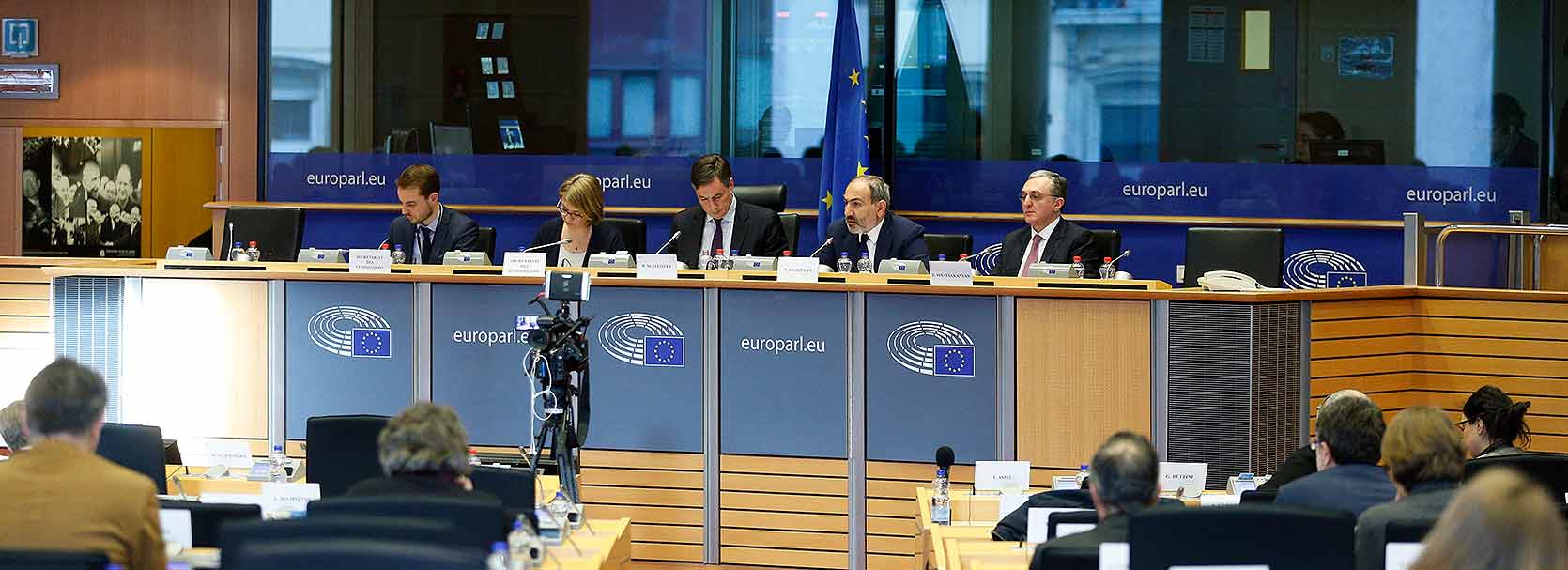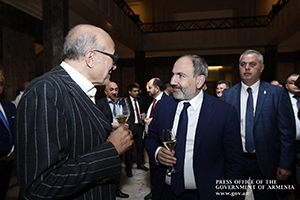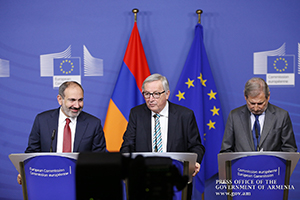- The PM’s first appearance in the European Parliament and first meeting with key EU leaders
- On the agenda: new Partnership Agreement ratification and implementation, visa facilitation, EU assistance, open borders and peace
- The PM returns to Brussels in May for the Eastern Partnership Summit
Armenia’s new Prime Minister, Nikol Pashinyan, was welcomed warmly in Brussels on the occasion of his first official visit to the European institutions on March 4 and 5. Pashinyan came to office after leading a popular revolution in the spring of 2018. He was confirmed in power in parliamentary elections held on December 9, 2018.
After his arrival in Brussels, Pashinyan addressed the Foreign Affairs Committee of the European Parliament. He subsequently met with key EU leaders: EU President Jean-Claude Juncker, Commissionner Johannes Hahn, Council president Donald Tusk and EU Representative for Foreign Affaires and Security Policy Federica Mogherini.
The visit was imbued with a sense of optimism as Nikol Pashinyan stressed that “after the Velvet Revolution Armenia’s determination and political will to enhance the partnership with the European Union has only increased”. EU Commission President Jean-Claude Juncker promised that “the more the Republic of Armenia is reformed, the more we will support Armenia, both financially and politically.”
Speaking in the European Parliament, Heidi Hautala MEP welcomed Pashinyan, confirming that the December 9, 2018 elections conformed to democratic standards. Hautala led the observation mission for these elections on behalf of the European Parliament. 11 other members of Parliament spoke after her to welcome the new PM, but many qualified their enthusiasm as they expressed concern at the considerable challenges facing the new leader. These include institutionalizing democracy in his country, economic development, the fight against poverty and problematic relations with two of Armenia’s four neighbours.
On democracy, Pashinyan’s message was that Armenia’s democratic transformation is now irreversible: “I am proud to declare that democracy is no longer endangered in Armenia”. The battle, he argued, is now economic and democracy will remain fragile if one third of the population continues to live in poverty: “we now need an economic revolution”, he said, as he outlined some of his reforms, such as simplifying legislation and taxation for small businesses, breaking up cartels and monopolies and fighting corruption.
The EU can help
The Premier used both his address in Parliament and his separate meetings with EU leaders to discuss enhanced cooperation and EU support to Armenia’s transformation.
He called, first of all, on EU Members States to ratify the landmark Comprehensive Enhanced Partnership Agreement signed last year between the EU and Armenia. He also pressed for visa facilitation for Armenian citizens, which will make it easier for them to travel to the EU.
For the Armenian PM, the European Union has an important role to play in helping the government of Armenia recover stolen assets through the EU’s asset recovery system and it should continue its support for reforms in Armenia.
Armenia’s economic development challenge is however closely linked to its international relations: “The security situation exerts a negative influence on Armenia’s attractiveness to foreign investment” he said, referring in particular to Armenia’s closed borders with Turkey and Azerbaijan, and to the US sanctions on a third neighbour, Iran.
Pashinyan therefore also broached the question of Armenia’s relations with neighbouring countries, with an appeal for “dialogue and mutual understanding”. “Closed borders are economic and political nonsense”, he said, and pleaded for “cooperation and tolerance in the Caucasus”.
With regards to the conflict in Nagorno-Karabakh more specifically, Pashinyan claimed to aspire to create an “atmosphere of dialogue” with Azerbaijan and emphasized that any settlement of the conflict will have to address the interests and concerns of all three parties: Azerbaijan, Armenia and also Nagorno-Karabakh itself. Arguing for the Karabakh leadership to be allowed into the negotiations, Pashinyan argued that he “was elected democratically by the people of Armenia, not by the people of Karabakh”.
These remarks echo those he made in May of 2018, which were sometimes interpreted as a threat by Armenia to exit the peace negotiations. EU High Representative for Security and Foreign Relations, Federica Mogherini, echoed that concern when she “advocated Prime Minister Pashinyan’s full engagement in negotiations without preconditions, under the auspices of the Minsk Group Co-Chairs”.
Other issues broached during the debate in Parliament included the need for a greater female representation in the Armenian delegation, relations with Russia, Georgia and Iran and a request for Armenia to ratify the Rome statute and thus join the International Criminal Court in the Hague.
Nikol Pashinyan will return to Brussels in May on the occasion of a Summit marking the 10th anniversary of the EU’s Eastern Partnership policy, which aims to deepen relations with the countries on the EU’s eastern periphery.




